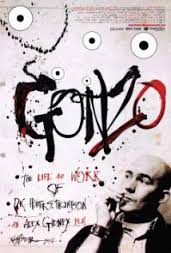
GONZO, THE LIFE AND WORK OF DR. HUNTER. S. THOMPSON
US, 2008, 120 minutes, Colour.
Directed by Alex Gibney.
Irrespective of the title of his films, director Alex Gibney has made two excellent documentaries that are well worth seeing, his expose of Enron, the Oscar-nominated Enron: the Smartest Men in the Room (probably all the more relevant in the current financial crises) and the Oscar-winning film about American torture in Afghanistan and Iraq, Taxi to the Darkside which is highly recommended.
Now he has taken on the famous, notorious, journalist Hunter S. Thompson, for whom the word 'Gonzo' was applied to his iconoclastic, anti-sacred-cows, hard-hitting journalism. How much of it was fuelled by his constant drug and alcohol consumption is hard to say but this film indicates quite a bit. But, he was a man who believed that writing could change the world. Thompson was a man of contradictions, hellbent on self-destruction (which culminated in his suicide by gunshot wounds in 2005) but hellbent on supporting the politics and politicians he approved of.
Gibney uses only Hunter's words thoughout the film, from audio tapes, film and television material. Johnny Depp reads his written words. Depp portrayed Thompson in the Terry Gilliam phantasmagoria, Fear and Loathing in Las Vegas, 1998), the visuals of which, in the monstrous fantasy style, by the drawings of his friend and collaborator, Ralph Steadman. He used fear and loathing as his trademark after his book, based on an actual journey, was published in 1971.
Thompson emerged in the later 1960s, through Rolling Stone magazine, with his targeting of American politics. This reached a climax in 1972, so the film shows us, with his campaigning for Democratic candidate, George Mc Govern, his starting destructive rumours (eagerly latched on to by the media irrespective of truth) about Ed Muskie. Needless to say, Thompson was anti-Nixon.
Thompson loved guns, a member of the NRA, and tried to be elected sheriff of Aspen. Contradictions.
There is a great number of interviewees in the film including Jimmy Carter, novelist Tom Wolfe and conservative Pat Buchanan who obviously still has a sneaking regard for Thompson.
Thompson's two wives also speak up, especially his first wife who has a mixture of exhilarating and bitter memories. His son also appears.
This is not just a portrait of a wildly eccentric journalist, a man of his changing times, but a close up of the mid-60s to the mid-70s. What the film does not explain is what happened to Thompson between 1980 and 2000. It seems as if he believed his own myths and publicity and carried on as a celebrity. There is some writing after 9/11 but, the film suggests he had passed his use by date and, after often talking about taking his life, he did.